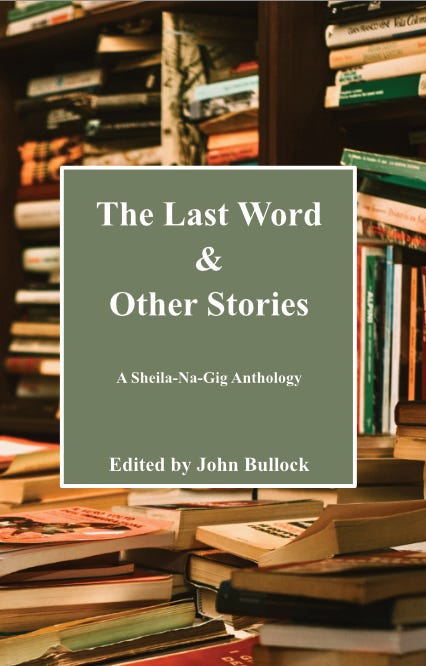Keeping Your Writing Alive in 2025
Falling in Love with Jane Alison: A Meter Cute Interview with Laura Leigh Morris
For the first Meter Cute of the year, I sat down with Laura Leigh Morris to talk about her novel The Stone Catchers and how to keep yourself grounded while writing about difficult topics. I hope you’ll give it a watch!
You can also read Laura’s work in the new anthology Women Speak from the Women in Appalachia Project.
In my own writing world, I have a new story out in Sheila-Na-Gig’s upcoming fiction anthology, The Last Word and Other Stories, edited by John Bullock (and available now for preorder!). My story is called “The Sparing of the Snails” and follows some of the characters from my story from last year’s anthology “A String of Beads,” but focuses on their new neighbor in Florida who just wants things to run as they should and has little patience for the now teenaged Nora.
Are you ready to do some writing? So, in 2025, I’ve decided to start using a new name for this section! It’s called “From Mayhem to Meter,” because I feel like that nicely encompasses the process, and it’s pretty catchy!
1) Set the timer for 10 minutes. Freewrite about a news story from at least 15 years ago. My original thought was to have this be about a current event, but I felt that might feel a little destabilizing for some folks, so am opting to have it be about an older event (but, as always, write whatever you feel moved to write about). Follow your brain wherever it leads you. Describe the event in as much or as little detail as you want. Who were the people involved? Where did it happen? Nothing is off topic and that Editor Voice better be completely turned off at this point. Write for the full 10 minutes. If you run out of things to write about, just write “I have no idea what to write about” until your brain catches up with you.
2) Set the timer for 10 minutes. Freewrite about a news story from before you were born. Don’t think too hard about this. Whatever popped into your head when you read the prompt, that’s what you should go with. What happened? Where did it happen? Who was involved? When did it happen? How did it happen? Follow that wonderful brain of yours wherever it may go. If you start writing about the Titanic and end up writing about the Andrea Doria or the Edmund Fitzgerald, great! Follow that brain! Write for the full 10 minutes.
3) Now time to en-rhythm! This is an important step and is based off the teachings of Annie Finch. The goal is to read something in a specific meter of your choosing for 10 minutes before writing. You can also do some movement instead. The idea is to get the rhythm of the meter into your heart and soul, so that when you go to write your brain will have latched onto it and it’ll just come pouring out of you (YMMV). So, set the timer for 10 minutes and read a single poem out loud for the full time (yes, over and over, do it, trust me, don’t stop early and don’t switch the poem around halfway through). Not sure what poem to use? I suggest W.H. Auden’s September 1, 1939, but anything in meter will work wonderfully.
If you’d rather move around a bit rather than reading aloud, try Shkodra Elektronike’s song “Zjerm,” Albania’s representative for Eurovision 2025 (sorry, y’all, Eurovision season is once again upon us and I’m back on my bullshirt). Remember, 10 minutes. Don’t switch to another song.
4) Okay, ready to draft? Set the timer for 10 minutes. Write a poem, short story, or essay about whatever’s on your mind right now. Nothing coming to you? Maybe write something that offers either strength or condemnation to the people involved in one of the events you wrote about in one of the earlier. Editor Voice can come on, but just the teensiest bit, like a 3 or 4. Let it offer some guidance on structure and maybe a little on word choice, but let it offer only suggestions, not demands.
And there you go! You’ve got a draft of a new piece to work on revising next week, next month, or the 12th of Never and it took less than an hour!
Thanks for letting me stop by!




